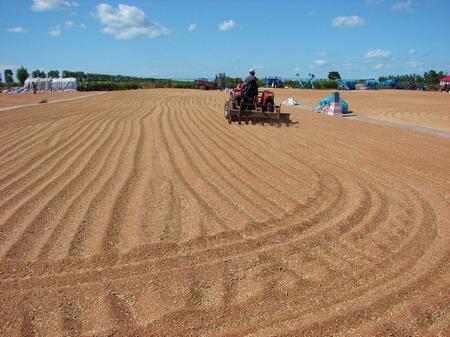
Farmers air wheat at Wudalianchi Farm in Heilongjiang province. [Lu Wenxiang / For China Daily]
Grain output this year will surpass 2009 levels, says province governor
HARBIN - Crop growth has been satisfactory in Northeast China, despite the weather vagaries and the region is on track for a good harvest, a top official said on Thursday.
Experts said the good crop forecast and the self-sufficient supply system will help the nation combat price fluctuations in global markets.
"Autumn grain output is under pressure this year due to weather fluctuations in some areas, but the crop growth has been good in Heilongjiang," Li Zhanshu, governor of Heilongjiang province, told China Daily.
"We are confident that this year's grain output will surpass last year's levels, if there are no serious disasters before the harvest season," Li said on the sidelines of the Third Global Forum of Leaders for Agricultural Science and Technology in Harbin, Heilongjiang province.
Heilongjiang produced 43.5 million tons of grain in 2009 and was ranked second in the nation after Henan province in terms of output.
An agricultural researcher with the Liaoning Academy of Agricultural Sciences, who declined to be named, said though corn output in some areas may decline due to the weather vagaries, the overall output will not be affected much.
Autumn grain output is considered a key indicator of inflationary pressure as fluctuations in grain prices can pass on to meat and other commodities, said analysts.
Grain harvested during the season accounts for about 70 percent of China's total grain output. China's summer grain output declined 0.3 percent year-on-year to 123.1 million tons this year, the first fall in seven years, according to the National Bureau of Statistics.
China had increased its rice and corn imports from Vietnam and United States in the past few months, sparking concerns that the moves would push up international grain prices.
"Grain imports are a temporary phenomenon and it will help reduce domestic prices," said Fan Shenggen, director-general of the International Food Policy Research Institution.
China still has the potential to be self-sufficient in grain production and will not be a major importer of wheat and corn in the long term, Fan said.
Being the most populous nation in the world, China's self-sufficiency is vital for global grain security, as it will ensure more grain for other countries, he said.
Wang Ren, director of the Consultative Group on International Agricultural Research, said price hikes in the international market, partly caused by Russia's ban on grain imports, will have little impact on the Chinese market.
During the first five months of this year, China imported agricultural products worth $56.32 million from Russia, a year-on-year growth of 33.2 percent. Imports of agricultural products during the same period grew by 42.1 percent to $26.52 billion.
Grain imports, such as wheat, only account for a relatively small part of China's overall demand.
"China has a relatively independent grain system, which provides a cushion for outside fluctuations," Wang said.





